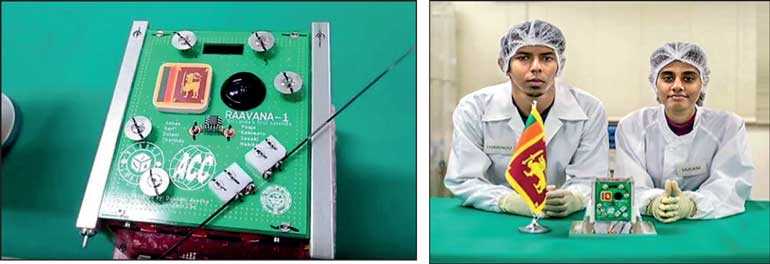Saturday Feb 21, 2026
Saturday Feb 21, 2026
Tuesday, 28 May 2019 00:00 - - {{hitsCtrl.values.hits}}

‘Raavana 1’, Sri Lanka’s first satellite, a cube satellite designed and developed by a team of Sri Lankan engineers was successfully carried to International Space Station from NASA’s Wallops Flight Facility on Wallops Island, Virginia on 18 February. Raavana 1 will be deployed to 400 km orbit in mid June 2019, and will be in operation from July 2019 onwards after establishing communication links with the ground station at Arthur C. Clarke Institute for Modern Technologies (ACCIMT).
This was part of a landmark project of the Arthur C. Clarke Institute for Modern Technologies, functions under the purview of the Ministry of Science, Technology and Research. ACCIMT is a key public sector technology institute in Sri Lanka working in this unique field of Space Technology (or Space Engineering).
The key objectives of this project are to elevate Sri Lanka in to the group of countries having designed and operated a satellite, showcase their research, design and development capabilities and most importantly enhancing local human capital pool with expertise and relevant exposure in advance technology areas with global demand.
Development of Raavana 1 is a part of the ‘Birds’ Project carried out by the Laboratory of Spacecraft Environment Interaction Engineering, Kyushu Institute of Technology (Kyutech), one of the leading national universities in Japan. The main aim of ‘Birds’ satellite development project is to assist none space faring developing countries to acquire space technology capabilities.
Sri Lanka represented by the Arthur C. Clarke Institute for Modern Technologies and participated two of its research engineers Tharindu Dayaratne and Dulani Chamika for this program in year 2017. At Kyutech Japan the two engineers teaming up with other engineers from Nepal and Japan developed three cube satellites for the three nations (one would be the first satellite of Nepal).
The missions (including payloads) to be undertaken by Raavana 1 are as follows:
Camera for the media and social outreach activities
Attitude Determination and Control System for active stabilisation of the satellite in the orbit
LoRa demonstration validate module (for future Nano satellite long range communication methods, this has to be tested)
Most Nano Satellites use a Hardware Back Plane for the satellite sub system interconnections which is having no flexibility. Raavana 1 consists of Software Backplane Based on Complex Programmable Logic Devices having full flexibility.
Study of the Orbit Magnetics (orbit of the ISS, 400 km) using a magnetometer for verification purposes.